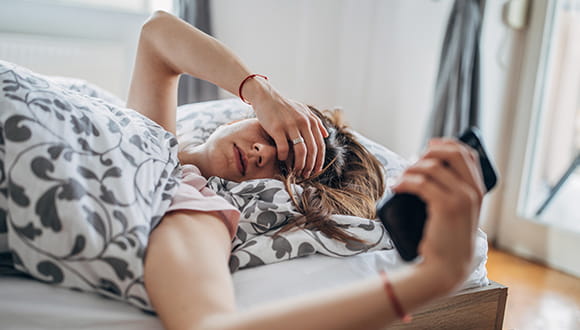Does Hitting the Snooze Button Help or Hurt?
Dec. 15, 2021 - Katie McCallumThe urge to hit the snooze button catches up to all of us now and then. For some, it's the way they greet most mornings.
You know you probably shouldn't be snoozing your alarm clock ... but your alert and thoughtful brain isn't making the decision; rather, it's a sleepy and impaired version of it. You have something called sleep inertia to thank for that.
Sleep inertia, characterized by that grogginess you feel when waking, is the temporary state between being asleep and being awake. Its effects include slower speed of thinking and reasoning so it's no wonder why it's so easy to hit the snooze button without second thought.
In fact, between sleep inertia and the coziness of your bed or the cold and dark looming outside, resisting the urge to not snooze can sometimes feel hopeless.
But in the absence of known consequences, like being late for work or school, is snoozing your alarm clock actually bad for you?
According to Dr. Aarthi Ram, a neurologist specializing in sleep medicine at Houston Methodist, it's certainly not helpful.
"You're not going to feel more rested by continuing to snooze your alarm clock," says Dr. Ram.
Why you shouldn't snooze your alarm clock
The problem with snoozing your alarm clock is that the fragmented sleep it brings isn't just without benefit, it might actually affect the rest of your day.
"The 10 more minutes of sleep you're granting yourself over and over and over isn't productive sleep," adds Dr. Ram. "If anything, all of that interrupted sleep will make you feel more groggy."
This is because pressing the snooze button may cause you to oversleep or throw off your sleep cycle. Both can increase your chances of feeling more tired during the day.
For starters, yes, it's possible to sleep too much, and — although it sounds counterintuitive — oversleeping actually makes you sleepier during the day. Oops.
And even when you're snoozing your alarm because you know haven't gotten enough sleep, the resulting deviations to your sleep schedule can throw off your body's internal clock, disrupting the timing of important biological processes. Not only can this leave you feeling fatigued when you'd normally feel alert, it might also affect other things, too, such as your metabolism, energy levels and more.
Additionally, studies suggest that the effects of sleep inertia become more intense if you're awakened during deep sleep, also called REM sleep. Hitting the snooze button repeatedly can increase your chance you'll eventually be awakened during that stage, which would leave you feeling even groggier than usual.
Finally, it can also affect the sleep of people in the same bed, room or even house as you — depending on one how loud your alarm is.
How to stop snoozing your alarm
Hitting the snooze button now and then probably isn't a huge deal, but if you're a chronic snoozer, here are five tips to help you break the habit.
1. Improve your sleep hygiene
Studies suggest that sleep inertia may also be felt more intensely after getting too little sleep or waking up during the night. Both can be prevented with proper sleep hygiene.
If sleep inertia truly is what makes resisting the urge to snooze so difficult, simply getting quality sleep may help you avoid making snooze decisions you'll later regret.
You can improve your sleep hygiene by:
- Getting between seven and nine hours of sleep every night
- Going to bed around the same time every night
- Waking up around the same time every morning
- Giving yourself time to wind down before bed
- Keeping your bedroom quiet, dark and cool
- Limiting afternoon naps and caffeine
- Avoiding alcohol and screen time before bed
- Avoiding drinking large amounts of fluid just before bed
- Exercising regularly
2. Set your alarm for a realistic time
You may be tempted to set your alarm way earlier than necessary to account for all of your snoozing, but this only acts as a crutch. Don't give yourself this excuse.
Setting your alarm for the time you actually need to wake up is the first step to creating a morning routine free of snoozing the alarm clock.
3. Sit up as soon as you wake up
When your alarm goes off, just making a simple posture change can help wake up your body and keep you from hitting snooze and going back to sleep.
4. Turn on a light once your alarm goes off
Light signals that it's time for your body to be awake and suppresses the production of melatonin, a sleep-promoting hormone. Exposing yourself to light as soon as your alarm goes off can help rouse you out of sleep inertia and into a more alert state.
If you can't be trusted to turn a lamp on or get up to open your curtains, you might consider using a smart bulb and setting it to a timer that matches your alarm wake up time.
5. Move your alarm clock across the room
If you're still having trouble avoiding hitting the snooze button, there's always the old move-the-alarm-clock-across-the-room trick. That forces you to physically get up, which helps in the process of waking up.
Surprised we're not recommending using a smart alarm that wakes you up at the most ideal time? These wearable devices and corresponding apps are touted to monitor your sleep and wait to wake you until you're in the lighter stages of sleep, when the effects of sleep inertia may be least potent. While this might help keep you from hitting snooze, research shows that these sleep tracking wearables may not actually be able to track sleep with such accuracy. There's no harm in trying a smart alarm, but be sure you're also considering the tips above, too.








